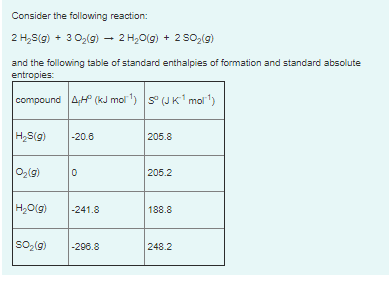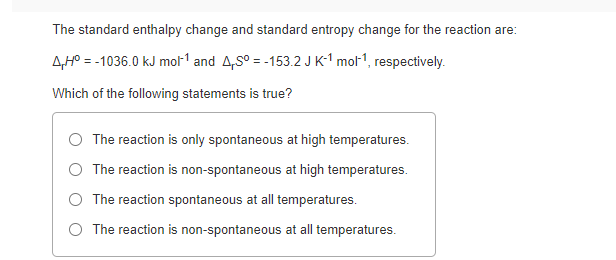The standard enthalpy change and standard entropy change for the reaction are: AHP = -1036.0 kJ mol1 and A,S° = -153.2 J K-1 mol1, respectively. Which of the following statements is true? The reaction is only spontaneous at high temperatures. The reaction is non-spontaneous at high temperatures. The reaction spontaneous at all temperatures. O The reaction is non-spontaneous at all temperatures.
The standard enthalpy change and standard entropy change for the reaction are: AHP = -1036.0 kJ mol1 and A,S° = -153.2 J K-1 mol1, respectively. Which of the following statements is true? The reaction is only spontaneous at high temperatures. The reaction is non-spontaneous at high temperatures. The reaction spontaneous at all temperatures. O The reaction is non-spontaneous at all temperatures.
Chemistry: Principles and Practice
3rd Edition
ISBN:9780534420123
Author:Daniel L. Reger, Scott R. Goode, David W. Ball, Edward Mercer
Publisher:Daniel L. Reger, Scott R. Goode, David W. Ball, Edward Mercer
Chapter5: Thermochemistry
Section: Chapter Questions
Problem 5.86QE: One of the components of jet engine fuel is n-dodecane, C12H26(), which has a standard enthalpy of...
Related questions
Question

Transcribed Image Text:Consider the following reaction:
2 H,S(g) + 30,(g) –- 2 H,O(g) + 2 SO,(g)
and the following table of standard enthalpies of formation and standard absolute
entropies:
compound AH (kJ mol") s° (JK' mol")
H,S(g)
-20.6
205.8
02(g)
205.2
H2O(g)
|-241.8
188.8
So,(9)
|-296.8
248.2

Transcribed Image Text:The standard enthalpy change and standard entropy change for the reaction are:
AHP = -1036.0 kJ mol1 and A,S° = -153.2 JK-1 mol1, respectively.
Which of the following statements is true?
The reaction is only spontaneous at high temperatures.
The reaction is non-spontaneous at high temperatures.
O The reaction spontaneous at all temperatures.
O The reaction is non-spontaneous at all temperatures.
Expert Solution
This question has been solved!
Explore an expertly crafted, step-by-step solution for a thorough understanding of key concepts.
Step by step
Solved in 2 steps with 1 images

Knowledge Booster
Learn more about
Need a deep-dive on the concept behind this application? Look no further. Learn more about this topic, chemistry and related others by exploring similar questions and additional content below.Recommended textbooks for you

Chemistry: Principles and Practice
Chemistry
ISBN:
9780534420123
Author:
Daniel L. Reger, Scott R. Goode, David W. Ball, Edward Mercer
Publisher:
Cengage Learning

Chemistry: The Molecular Science
Chemistry
ISBN:
9781285199047
Author:
John W. Moore, Conrad L. Stanitski
Publisher:
Cengage Learning

Principles of Modern Chemistry
Chemistry
ISBN:
9781305079113
Author:
David W. Oxtoby, H. Pat Gillis, Laurie J. Butler
Publisher:
Cengage Learning

Chemistry: Principles and Practice
Chemistry
ISBN:
9780534420123
Author:
Daniel L. Reger, Scott R. Goode, David W. Ball, Edward Mercer
Publisher:
Cengage Learning

Chemistry: The Molecular Science
Chemistry
ISBN:
9781285199047
Author:
John W. Moore, Conrad L. Stanitski
Publisher:
Cengage Learning

Principles of Modern Chemistry
Chemistry
ISBN:
9781305079113
Author:
David W. Oxtoby, H. Pat Gillis, Laurie J. Butler
Publisher:
Cengage Learning

Chemistry: Matter and Change
Chemistry
ISBN:
9780078746376
Author:
Dinah Zike, Laurel Dingrando, Nicholas Hainen, Cheryl Wistrom
Publisher:
Glencoe/McGraw-Hill School Pub Co

General Chemistry - Standalone book (MindTap Cour…
Chemistry
ISBN:
9781305580343
Author:
Steven D. Gammon, Ebbing, Darrell Ebbing, Steven D., Darrell; Gammon, Darrell Ebbing; Steven D. Gammon, Darrell D.; Gammon, Ebbing; Steven D. Gammon; Darrell
Publisher:
Cengage Learning

Chemistry: An Atoms First Approach
Chemistry
ISBN:
9781305079243
Author:
Steven S. Zumdahl, Susan A. Zumdahl
Publisher:
Cengage Learning